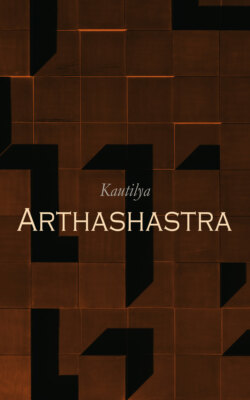Читать книгу Arthashastra - Kautilya - Страница 21
На сайте Литреса книга снята с продажи.
CHAPTER XIX. THE DUTIES OF A KING.
ОглавлениеTable of Contents
IF a king is energetic, his subjects will be equally energetic. If he is reckless, they will not only be reckless likewise, but also eat into his works. Besides, a reckless king will easily fall into the hands of his enemies. Hence the king shall ever be wakeful.
He shall divide both the day and the night into eight nálikas (1½ hours), or according to the length of the shadow (cast by a gnomon standing in the sun): the shadow of three purushás (36 angulás or inches), of one purushá (12 inches), of four angulás (4 inches), and absence of shadow denoting midday are the four one-eighth divisions of the forenoon; like divisions (in the reverse order) in the afternoon.
Of these divisions, during the first one-eighth part of the day, he shall post watchmen and attend to the accounts of receipts and expenditure; during the second part, he shall look to the affairs of both citizens and country people; during the third, he shall not only bathe and dine, but also study; during the fourth, he shall not only receive revenue in gold (hiranya), but also attend to the appointments of superintendents; during the fifth, he shall correspond in writs (patrasampreshanena) with the assembly of his ministers, and receive the secret information gathered by his spies; during the sixth, he may engage himself in his favourite amusements or in self-deliberation; during the seventh, he shall superintend elephants, horses, chariots, and infantry, and during the eighth part, he shall consider various plans of military operations with his commander-in-chief.
At the close of the day, he shall observe the evening prayer (sandhya).
During the first one-eighth part of the night, he shall receive secret emissaries; during the second, he shall attend to bathing and supper and study; during the third, he shall enter the bed-chamber amid the sound of trumpets and enjoy sleep during the fourth and fifth parts; having been awakened by the sound of trumpets during the sixth part, he shall recall to his mind the injunctions of sciences as well as the day's duties; during the seventh, he shall sit considering administrative measures and send out spies; and during the eighth division of the night, he shall receive benedictions from sacrificial priests, teachers, and the high priest, and having seen his physician, chief cook and astrologer, and having saluted both a cow with its calf and a bull by circumambulating round them, he shall get into his court.
Or in conformity to his capacity, he may alter the timetable and attend to his duties.
When in the court, he shall never cause his petitioners to wait at the door, for when a king makes himself inaccessible to his people and entrusts his work to his immediate officers, he may be sure to engender confusion in business, and to cause thereby public disaffection, and himself a prey to his enemies.
He shall, therefore, personally attend to the business of gods, of heretics, of Bráhmans learned in the Vedas, of cattle, of sacred places, of minors, the aged, the afflicted, and the helpless, and of women;---all this in order (of enumeration) or according to the urgency or pressure of those works.
All urgent calls he shall hear at once, but never put off; for when postponed, they will prove too hard or impossible to accomplish.
Having seated himself in the room where the sacred fire has been kept, he shall attend to the business of physicians and ascetics practising austerities; and that in company with his high priest and teacher and after preliminary salutation (to the petitioners).
Accompanied by persons proficient in the three sciences (trividya) but not alone lest the petitioners be offended, he shall look to the business of those who are practising austerities, as well as of those who are experts in witchcraft and Yóga.
Of a king, the religious vow is his readiness to action; satisfactory discharge of duties is his performance of sacrifice; equal attention to all is the offer of fees and ablution towards consecration.
In the happiness of his subjects lies his happiness; in their welfare his welfare; whatever pleases himself he shall not consider as good, but whatever pleases his subjects he shall consider as good.
Hence the king shall ever be active and discharge his duties; the root of wealth is activity, and of evil its reverse.
In the absence of activity acquisitions present and to come will perish; by activity he can achieve both his desired ends and abundance of wealth.
[Thus ends Chapter XIX, “The Duties of a King” in Book I. “Concerning Discipline” of the Arthasástra of Kautilya.]
